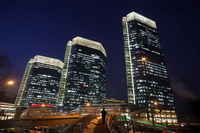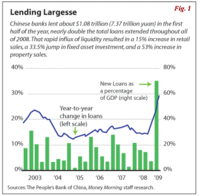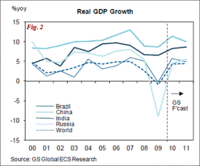China Is No Dubai Or Enron: Real Estate Rebalance To Buoy Gold
In China housing starts nationwide rose a staggering 194% year-over-year in November 2009. And the central bank noted new home mortgages in the first nine months of last year totaled about $139.5 billion, quadruple the amount offered a year earlier.
The China Daily noted that in terms of house prices as a proportion of incomes, China is now the most expensive place in the world. Indeed, there is a whiff of Dubai about the Chinese property market at the moment. By one estimate, the vacancy rate of Pudong, the central business district of Shanghai, is as high as 50% This is not to say there's not a real estate bubble in China. Rather, overinvestment and overbuilding is sometimes a prerequisite of an anticipated mass urban migration such as the one China is destined to experience.
The central bank, which has kept its benchmark one-year lending rate at a five-year low of 5.31% after five reductions late 2008, has allowed a record $1.4 trillion of new bank loans in the first 11 months of 2009. (Fig. 1
)
Now, China's policy makers are seeking to sustain its economic rebound, propelled mostly by the construction boom that has been spurred by its unprecedented fiscal stimulus and loose credit.
New Home Loans up 400%
Investment in real estate development is a key driver of economic growth. Total investment in construction projects during the first 8 months of 2009 has increased by 36.2% year-over-year, while total planned investment in new projects in the same period has risen by 81.7%, year-on-year.
Meanwhile, housing starts nationwide rose a staggering 194% year-over-year in November 2009. And the central bank noted new home mortgages in the first nine months of last year totaled about $139.5 billion, quadruple the amount offered a year earlier.
Home price at 80 Times the Average Income
According to Knight Frank, average prices for new homes year-to-date in November 2009 rose by 68% in Shanghai, 66% in Beijing and 51% in Shenzhen. Beijing's Chaoyang district, which represents a third of all residential property deals in the capital, a typical 1,000-sq.-ft. apartment costs about 80 times the average annual income of the city's residents.
The China Daily noted that in terms of house prices as a proportion of incomes, China is now the most expensive place in the world.
Whiff of Dubai ..., Maybe
In addition, signaling a move out of deflation, China's consumer prices climbed 0.6% in November from a year earlier, the first uptrend in nine months; while the Shanghai Property Index of 33 stocks also has doubled in 2009.
The surge in new bank loans and home prices has prompted concerns that some of the money is leaking into property and equity markets, fuelling bubbles that will eventually burst and derail the economy.
Indeed, there is a whiff of Dubai about the Chinese property market at the moment. By one estimate, the vacancy rate of Pudong, the central business district of Shanghai, is as high as 50%. However, that did not seem to have fazed new skyscraper construction projects nearby.
Neither A Dubai Nor An Enron Be
As indicated in my previous article
, China is a communist country with capitalistic power. This is not an economy where price signals always decide business strategy. Despite China Bears such as James Chanos, predicting an economic crash in China
, there are some strong fundamentals underpinning the market. (Note: James Chanos' rise to fame came form a critical short call and position of Enron.)
The U.S. financial crisis was mostly a result of the securitization of mortgages, but that is not part of the China's market structure. So, the impact of a bursting Chinese real estate bubble would likely be more muted, given the government's involvement in its market.
As pointed out by Michael Pettis
, an economics professor at Peking University, China's economy isn't nearly as dependent on real estate as the U.S. economy was. The wealth effect of collapses in the real estate and stock markets isn't likely to be big enough to affect consumption. Not only are these markets relatively small as a share of Chinese savings, but ownership is heavily concentrated among the relatively richer.
Moreover, in recent years, incomes have mostly risen faster than house prices on average, and homeowner debt levels are low. Urbanization is another power fundamental force. According to the State Council, as many as 400 million people could move to cities over the next two decades. That's about 322 Dubai's.
This is not to say there's not a real estate bubble in China. Rather, overinvestment and overbuilding is sometimes a prerequisite of an anticipated mass urban migration
such as the one China is destined to experience. (See Fig 2: BRIC Real GDP Growth
)
Equal Opportunity – Gold & Real Estate
China, still a developing country, lacks a proper social safety net and developed financial markets. So Chinese, individuals and corporations alike, are naturally thrifty. In fact, the Chinese corporate sector has been an important driver of savings growth over the past decade.
With an underdeveloped financial system, companies understandably end up putting retained earnings, or savings, into new investment, which also enjoys state subsidies. Companies in the chemical, steel, textile, and shoe industries reportedly have started up property divisions for a quicker return than their primary business.
Moreover, Chinese traditionally treat real estate as "stores of value", just like gold. With few other investment options, people put a big chunk of savings into real estate, driving up house prices in plenty of cities.
Government measures and policies including low interest rates, official encouragement of bank lending, and then Beijing's half-trillion-dollar stimulus, tax breaks and low down payment requirement all have buoyed the real estate investment.
And some of the very same fear factors driving up the gold prices, inflation and a bubble that could burst later in 2010, are also fueling the real estate rush.
Rebalance in Progress
Though housing starts in China spiked 194% in 2009, 90% of the new supply is targeted towards the more lucrative luxury market. Chinese Premier Wen Jiabao told Xinhua in an interview on Dec.
27 that the government would use taxes and mortgage rates to stabilize house prices and take measures to clamp down on house speculation.
To discourage speculation, the State Council, China's cabinet Sunday issued a notice rolling out eleven fresh measures
for the property market, and is re-imposing a sales tax on homes sold within five years. Tighter rules on mortgages are expected to follow.
However, the government is careful not to crack down too hard because construction, steel, cement, and other sectors are directly tied to the real estate. In November, for example, retail sales of furniture and construction materials jumped more than 40%.
For a soft landing, Beijing needs not only to rebalance its economy, but also to rebalance its housing market. This will likely involve changing the incentives to move investments into much-needed low-income housing and other investment vehicles.
Redirection To Gold
The measures by Beijing to rein in liquidity as well as the overheated real estate sector inevitably would re-direct the capital flow into other sectors. Given the traditional distrust of paper investments by the 1.5 billion Chinese citizens, and China's continued economic growth (Fig. 2
), god is poised to benefit the most from the expected shift in investment since gold shares most of the "hard assets" characteristics of the real property.
The gold market is already buzzing that the Chinese government was running ad campaign urging citizens to buy gold and silver
, while easing the restrictions of holding precious metals by the individual.
China, the largest gold producer, is also set to overtake India as the world's largest gold consumer. On recent trends, China's gold purchases have grown 10% from 2008's record in volume terms, accounting for almost one ounce in every eight sold worldwide.
This trend would likely ensure private gold demand to remain very robust beyond the domestic production, and nudge the global gold market to be less dictated by the Dollar movement.
Base Commodities, Interest Rate & Yuan
At the December Central Economic Work Conference, officials said real estate would continue to be a key driver of growth. So, this is a reassurance that the base commodities will unlikely suffer a drastic decrease in demand from the tightening of the housing sector.
Although the China real estate bubble burst should have a fairly muted overall effect as discussed here; nevertheless, if loan defaults start to rise, China might need to raise cash to keep its banks afloat. In that case, it might sell a chunk of its $2.2 trillion in U.S. debt, which would likely presure the Dollar and drive up interest rates in the U.S.
BNP Paribas said in a report dated Jan. 7. that the Chinese central bank is likely to implement "a series of hikes" in 3-month and 1-year bill auction yields to guide market expectations of a monetary policy shift and may raise the bank reserve ratio in the first quarter.
Meanwhile, some economists believe inflationary pressures might push Beijing to let Yuan appreciate by mid-2010. However, Premier Wen's recent statement in a Xinhua interview - "We will absolutely not yield to pressure to appreciate.", pretty much says that China will most likely keep Yuan firm in the medium term to stabilize its recovery by keeping its advantage on exports.
"I find it interesting that people who couldn't spell China 10 years ago are now experts on China." ~ Jim Rogers



